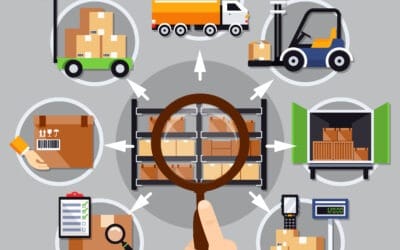IMPECCABLE CONTROL | PRODUCTION TRACKING SYSTEM
Tracking from Warehouse to Production Line, from Production Line to Shipment is Possible!
RFID technology to automatically track and record various aspects of the production process.
RFID PRODUCTION TRACKING SYSTEM
GENERAL FEATURES OF THE SYSTEM
A production tracking system enables the tracking and management of materials and products in the production process. This system uses RFID tags and readers to track the location and movement of materials and products in the production process. In this way, up-to-date information can be accessed during the production process, errors and delays can be detected and production processes can be made more efficient.
All production stages can be monitored through a centralized system.
It eliminates the risk of under- or over-counting and faulty product entry and exit due to human error.
Thanks to the RFID tags embedded in the products, each product will have its own unique number, such as a serial number, so that it can be tracked at every stage from the beginning to the end of production without being confused with other products.
The entry of raw materials or partially processed sub-industrial products into your business can be tracked and counted in quantities, parcels, pallets or containers,
By reducing the use of materials and energy in the production process, it can increase sustainability.
How does the RFID PRODUCTION TRACKING SYSTEM work?
- Tagging: Every product or component in the manufacturing process is tagged with an RFID tag or chip. This tag carries the product’s unique identification number (UID). This identification number can include the product’s characteristics and traceability information.
- Readers and Antennas: RFID readers and antennas are placed at different points on the production line. These readers read the data on the tags of products or components with radio waves.
- Data Collection: As the product or component moves through the production line, RFID tags are detected by readers. The reader receives the identification number and other relevant information from the tag.
Advantages of the System
Real Time Monitoring
It allows products to be tracked at every stage in the supply chain.
Data Accuracy
Automatic RFID reading minimizes data entry errors and enables more accurate monitoring of production processes.
Theft and Forgery Prevention
By enabling products to be tracked, it can reduce the risk of theft and counterfeiting.
Time Saving
It eliminates time-consuming processes such as manually scanning products or entering handwritten data.
Inventory Management and Tracking
The inflow and outflow of products is automatically recorded, so stock levels are better managed.
Areas of Use
In general terms, the production tracking system is used in every area where production takes place. This system is used in factories, R&D centers and production centers.
Sources
OTHER SOLUTIONS
RFID FAST COUNT SYSTEM
RFID fast counting system enables fast and accurate counting of products using RFID tags. This system can provide faster and more accurate results compared to barcode scanning. In addition, RFID tags can also be used to track the position and movement of objects.
Other Content
Keep following us to be informed about all developments in the field of RFID and IoT. New information and new solutions coming soon…
RFID Smart Production Solutions
In the fast-paced world of manufacturing, productivity is king. Every second counts and every process needs to be optimized to ensure maximum productivity. That’s where RFID smart production solutions come in, revolutionizing the way manufacturing operations are managed and executed. In this article, we explore the transformative power of RFID technology and its role in shaping the future of manufacturing.
Understanding RFID Technology
RFID technology uses radio waves to identify and track objects, assets and products in real time. It consists of tags or labels attached to items, readers or antennas that collect data from these tags, and a back-end system that processes and manages the collected information. Unlike traditional barcodes, RFID tags do not require line-of-sight scanning and can store a wealth of data, making them ideal for a variety of applications in manufacturing.
Advanced Asset Tracking and Management
One of the key benefits of RFID smart production solutions is the ability to accurately track and manage assets throughout the production process. By tagging raw materials, components and finished goods with RFID tags, manufacturers gain real-time visibility into the location and status of their inventory. This visibility enables better inventory management, reduces stockouts, minimizes excess inventory and streamlines the replenishment process.
Streamlined Production Processes
RFID technology also plays an important role in streamlining production processes. By placing RFID tags on work-in-progress (WIP) items and production equipment, manufacturers can monitor the flow of goods through the production line in real time. This allows for better production planning and scheduling, as well as the identification of bottlenecks or inefficiencies that can be addressed to improve overall productivity.
Real Time Information
– know what happened, when it happened and why
Operational Flexibility
– adapt quickly to changing production needs
Flawless Productivity
– holistically manage assets and inventory and scale on demand
Customized solutions
– easily customize data exchanges and workflows
Quality Control and Traceability
Maintaining product quality and ensuring traceability in production is crucial, especially in industries such as automotive, aerospace and pharmaceuticals. RFID smart manufacturing solutions enable manufacturers to implement robust quality control measures by tracking the movement of components and recording production parameters at every stage of the manufacturing process. In the event of a quality issue or product recall, RFID technology facilitates fast and accurate traceability, allowing manufacturers to identify affected products and take appropriate corrective action.

Workforce Optimization
Beyond asset and production management, RFID technology can also be leveraged to optimize workforce productivity. By equipping workers with RFID-enabled badges or wearables, manufacturers can track their movements and activities on the shop floor. This data can be used to analyze workflow patterns, identify opportunities for process improvement and ensure compliance with safety protocols.
Looking to the Future
As technology continues to evolve, the potential applications of RFID smart manufacturing solutions in manufacturing are limitless. Advances in RFID tag miniaturization, sensor integration and data analytics promise to further enhance the capabilities of RFID technology, paving the way for greater efficiency, agility and innovation in manufacturing operations.
As a result, RFID smart production solutions are transforming the manufacturing environment by providing real-time visibility, improving process efficiency, guaranteeing product quality and optimizing workforce productivity. As manufacturers embrace the power of RFID technology, they are poised to gain a competitive advantage in an increasingly complex and dynamic global marketplace.
Make Your Business Processes Efficient with RFID
In today’s fast-paced business environment, efficiency is key to staying ahead of the competition. One of the technologies revolutionizing operations across various industries is Radio Frequency Identification. Make your business processes efficient with RFID and unlock the most advantages.
Advanced Inventory Management
RFID tags enable real-time tracking of inventory throughout the supply chain. With RFID readers strategically placed in warehouses and distribution centers, businesses can accurately monitor stock levels and locate products quickly. This eliminates the need for manual inventory counts, reducing errors and saving valuable time. What’s more, RFID technology provides insights into inventory movement patterns, allowing businesses to optimize stock levels and minimize excess inventory, thus freeing up capital that can be invested elsewhere.

Optimized Asset Tracking
Lost or misplaced assets can place a significant strain on resources. RFID technology allows businesses to precisely tag and track assets. Whether it’s equipment in a healthcare facility or tools on a construction site, RFID systems provide visibility into the location and condition of assets, minimizing losses and streamlining maintenance processes. This not only minimizes the risk of loss or theft, but also streamlines maintenance processes by facilitating proactive service based on usage patterns and condition monitoring.
Increased Efficiency in Logistics
RFID-enabled logistics operations can streamline processes from shipment to delivery. By tagging packages and pallets with RFID tags, companies can automate tracking and routing, improve accuracy and reduce transportation times. This level of visibility enables better coordination with suppliers and carriers, leading to smoother operations and satisfied customers. In addition, RFID technology enables real-time monitoring of environmental conditions during transportation, ensuring the integrity of sensitive goods such as pharmaceuticals or perishables.
As a result, integrating RFID technology into your processes can lead to significant efficiency gains in your operations. From inventory management to logistics, RFID systems offer a versatile solution to meet the demands of today’s business environment. Embrace RFID and make your business processes efficient with RFID. Move towards greater productivity and success.
RFID Inventory Tracking
What is RFID:
RFID is a technology that uses electromagnetic fields to automatically identify and track RFID tags on objects. These tags contain electronically stored information that can be read remotely without requiring direct line of sight.
Limitations of Traditional Inventory Tracking Methods
Prior to the adoption of RFID, businesses relied heavily on manual methods or barcode scanning for inventory management. These methods, while functional to some extent, present significant limitations. Manual counts were labor intensive, time consuming and prone to human error. Barcode scanning, while faster than manual counts, still required close range and line-of-sight scanning, making large-scale monitoring cumbersome.

Revolutionize Inventory Management
RFID technology has ushered in a new era of inventory management. Unlike traditional methods, RFID enables real-time, automated tracking without the need for direct visibility. This technology consists of three main components. RFID tags, RFID readers and a back-end system.
- RFID Tags: These small, durable devices are attached to individual items or pallets. Each RFID tag also contains a unique identifier and sometimes additional data about the item.
- RFID Readers: These devices emit radio waves and capture the signals sent by RFID tags. Readers can operate at distances ranging from a few inches to several yards.
- Backend System: Captured RFID data is sent to a centralized database that can integrate with inventory management software. This provides businesses with real-time information on RFID stock tracking, stock levels, locations and movement patterns.
What are the Advantages of RFID Inventory Tracking
Adopting RFID technology for stock tracking provides numerous benefits that positively impact businesses:
- Real-Time Tracking: RFID enables businesses to track their inventory in real time. This eliminates delays caused by manual counts or barcode scanning.
- Accuracy: With RFID, the possibility of human error is greatly reduced, resulting in more accurate inventory data.
- Efficiency: Automated tracking increases operational efficiency by reducing the time and resources required for inventory management.
- Visibility: RFID technology provides visibility into inventory movement and stock levels. It also helps with demand forecasting and prevents stock-outs.
- Cost Savings: While the initial investment in RFID technology may be higher, the long-term cost savings from improved accuracy and efficiency in RFID inventory tracking are significant.

RFID Applications in Industries
The impact of RFID inventory tracking goes beyond retail. Industries such as healthcare, manufacturing, logistics and even agriculture have adopted RFID technology to streamline their operations. In healthcare, RFID enables accurate medication tracking and reduces the risk of errors. Manufacturers use RFID for production line optimization and supply chain visibility.
What RFID Inventory Tracking Will Do in the Future
As technology advances and costs come down, adoption of RFID inventory tracking will likely become more widespread. Printable, flexible RFID tags and improved reader range will further enhance the capabilities of RFID technology.
As a result
RFID stock tracking is a transformative technology that is revolutionizing the way businesses manage their inventory. RFID increases efficiency by enabling real-time, automated tracking and providing accurate data. This reduces errors and increases visibility across industries. While there are challenges with RFID inventory tracking, the advantages far outweigh the disadvantages. This makes RFID a valuable asset in the pursuit of operational excellence.






